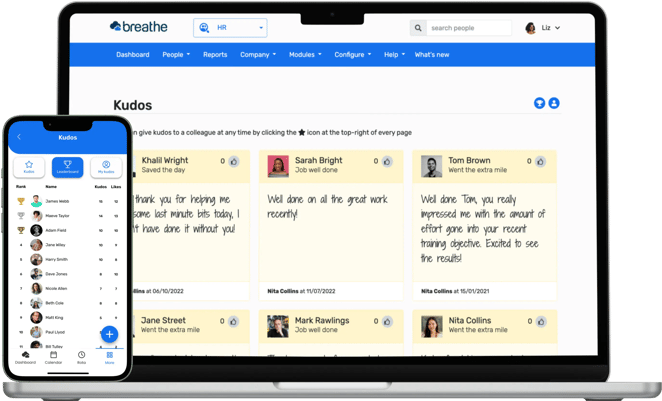What does kudos mean?
Derived from Greek, kudos means 'praise given for achievement'.
Saying thanks to a colleague for a job well done would be considered kudos to them.
Kudos can take many forms, such as public praise or private praise, and understanding an employee's personality type can help determine which approach is most effective.
Aligning recognition with company values
Aligning employee recognition with your company values? It's one of the most powerful ways to build a positive workplace culture and drive real business success. When you link your employee recognition programme closely to what your company actually stands for, you're sending a crystal-clear message about what matters most in your organisation.
Recognising your people for actions and behaviours that reflect these values doesn't just motivate employees - it sets a brilliant example for others, helping to shape that ideal company culture where everyone feels valued and appreciated.
If you want to truly motivate your employees and drive engagement, you'll need to go beyond generic praise (we've all been there). Instead, focus on employee recognition ideas that highlight exactly how someone's actions support your core values.
For example, if collaboration's a key company value, you might recognise employees who go the extra mile to support their peers or who contribute to team success. This approach encourages other employees to embody these values in their everyday work, reinforcing a culture of appreciation and shared purpose that actually works.
Here's where it gets interesting: peer-to-peer recognition is especially effective in this context. When your employees recognise each other for living the company values, it creates a real sense of community and shared responsibility.
Peer recognition often feels more personal and meaningful, and it can have a much greater impact on employee engagement than recognition from senior leaders alone. By openly encouraging peer recognition, you're empowering everyone to contribute to a positive workplace culture.
Timely recognition is also essential (and we can't stress this enough). Recognising employees as soon as they demonstrate company values ensures that the positive behaviour gets reinforced and they're more likely to repeat it.
Public recognition - think sharing kudos in team meetings or on company platforms - can amplify the impact, providing a positive example for other employees and strengthening the connection between recognition and company values.
And when you think about it, the research speaks for itself. Organisations with a formal recognition programme aligned to company values experience 31% less voluntary turnover and are nearly three times more likely to be highly engaged within the business.
When your employees feel valued and see that their contributions are recognised in meaningful ways, employee satisfaction, engagement, and productivity all increase - leading to a more successful business that everyone wants to be part of.
How can small businesses recognise their employees?
Employee recognition is as simple as thanking your employees when they do something well, put extra effort in, or complete something that's been a particular personal challenge for them.
What matters is that SMEs consistently recognise their team, and that this culture flows down from the top. If managers know that employee recognition is something that regularly and genuinely happens within your small business it'll soon become part of your everyday culture.
Some businesses offer bonus schemes or additional benefits like private healthcare or career development programmes to ensure their people get recognised (and maybe promoted) for their hard work. However, rewards don't have to be expensive - low cost recognition methods, such as a simple thank you or a personal note, can be highly effective. Our guide to employee benefits provides additional inspiration if you’re thinking of ways to give back to your team.
Managers can encourage and openly encourage employees by providing regular feedback and personal recognition, which helps reinforce positive behaviours and supports employee wellbeing.
When employees have received recognition, they are more likely to contribute new ideas and feel motivated, helping your business grow and innovate.
Breathe's Kudos recognition tool - designed for SMEs
Thanks to Breathe's Kudos feature, you can say thanks to colleagues and recognise their achievements - with a helpful note or comment for all the business to see and engage with.
Companies use recognition tools like this to create a positive work environment and attract top talent.
You can choose a person to recognise, and the category - or Kudos type.

The best bit? You can trial for free for 14 days - no strings.
Anyone within your organisation can send Kudos to anyone else - and it's sure to make their day.
It's now easier than ever to give and receive Kudos, in Breathe’s People Portal mobile app, where you can also keep an eye on your Kudos leaderboard, to see who's being recognised for their hard work this month.
Create a positive company culture in your organisation, avoid the pitfalls of transactional analysis and show some recognition of your people's hard work.
Receiving recognition through the tool can boost morale and engagement.
Kudos to that.
FAQs
Q: What is employee recognition and why does it matter?
A: Employee recognition is the act of acknowledging and appreciating your team’s efforts, achievements, and positive behaviours. It matters because it boosts morale, engagement, and loyalty - helping to create a positive company culture where people feel valued and motivated to perform at their best.
Q: What does Kudos mean in the workplace?
A: Kudos simply means praise or credit given for a job well done. In the workplace, giving Kudos is a way to show appreciation - whether through public recognition, private thanks, or peer-to-peer feedback - that reinforces positive behaviours and supports a healthy, motivated culture.
Q: How does employee recognition improve retention and engagement?
A: Recognising employees regularly makes them feel valued and connected to the business, increasing engagement and reducing turnover. Research shows that employees who believe their work will be recognised are nearly three times more likely to be highly engaged and stay longer with their company.
Q: How can small businesses recognise their employees effectively?
A: SMEs can recognise employees in simple yet meaningful ways, such as saying thank you, giving shout-outs in meetings, writing personal notes, or using peer-to-peer tools like Breathe’s Kudos feature. Consistency is key - when recognition is genuine and regular, it naturally becomes part of company culture.
Q: Why is aligning recognition with company values important?
A: Aligning recognition with your business values reinforces what matters most to your organisation. When employees are recognised for demonstrating those values - such as teamwork, integrity, or innovation - it strengthens your culture, promotes the right behaviours, and helps everyone feel part of a shared purpose.
Q: What is Breathe’s Kudos tool and how does it work?
A: Breathe’s Kudos tool lets you celebrate colleagues’ achievements by sharing appreciation directly within your HR system. Anyone in the company can send Kudos to recognise great work, with the option to add a category or comment. It’s easy to use, boosts morale, and is available in the Breathe People Portal and mobile app.








